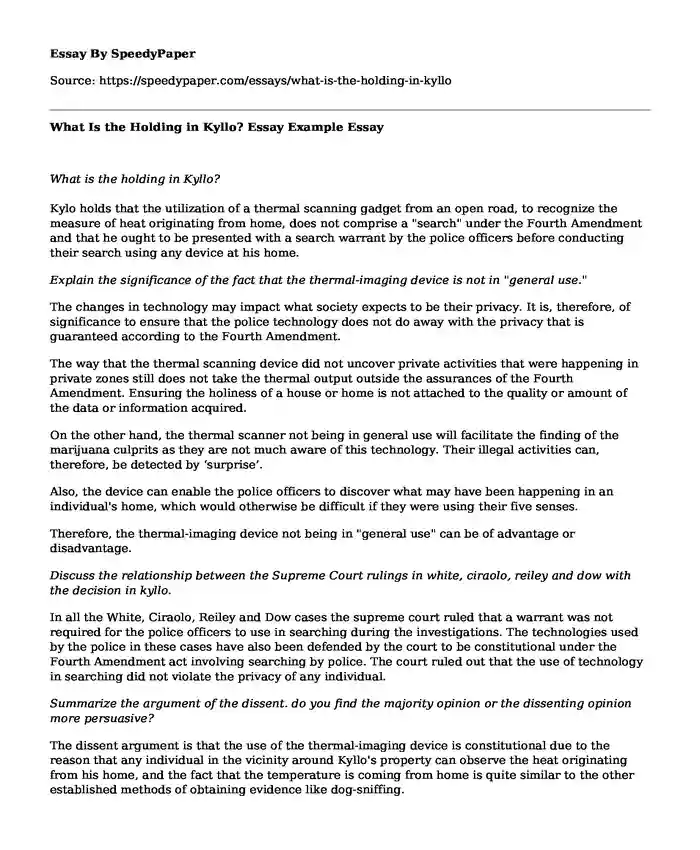
| Type of paper: | Essay |
| Categories: | Technology Court system Police |
| Pages: | 3 |
| Wordcount: | 680 words |
What is the holding in Kyllo?
Kylo holds that the utilization of a thermal scanning gadget from an open road, to recognize the measure of heat originating from home, does not comprise a "search" under the Fourth Amendment and that he ought to be presented with a search warrant by the police officers before conducting their search using any device at his home.
Explain the significance of the fact that the thermal-imaging device is not in "general use."
The changes in technology may impact what society expects to be their privacy. It is, therefore, of significance to ensure that the police technology does not do away with the privacy that is guaranteed according to the Fourth Amendment.
The way that the thermal scanning device did not uncover private activities that were happening in private zones still does not take the thermal output outside the assurances of the Fourth Amendment. Ensuring the holiness of a house or home is not attached to the quality or amount of the data or information acquired.
On the other hand, the thermal scanner not being in general use will facilitate the finding of the marijuana culprits as they are not much aware of this technology. Their illegal activities can, therefore, be detected by ‘surprise’.
Also, the device can enable the police officers to discover what may have been happening in an individual's home, which would otherwise be difficult if they were using their five senses.
Therefore, the thermal-imaging device not being in "general use" can be of advantage or disadvantage.
Discuss the relationship between the Supreme Court rulings in white, ciraolo, reiley and dow with the decision in kyllo.
In all the White, Ciraolo, Reiley and Dow cases the supreme court ruled that a warrant was not required for the police officers to use in searching during the investigations. The technologies used by the police in these cases have also been defended by the court to be constitutional under the Fourth Amendment act involving searching by police. The court ruled out that the use of technology in searching did not violate the privacy of any individual.
Summarize the argument of the dissent. do you find the majority opinion or the dissenting opinion more persuasive?
The dissent argument is that the use of the thermal-imaging device is constitutional due to the reason that any individual in the vicinity around Kyllo's property can observe the heat originating from his home, and the fact that the temperature is coming from home is quite similar to the other established methods of obtaining evidence like dog-sniffing.
The majority opinion is more persuasive than the dissent because any form of search needs a warrant. The dissent opinion of observing a person’s homestead will in the end result to a search even if you have found anything 'fishy'. This search is what needs a permit.
Describe the steps that the police officers in kyllo should have taken before using the thermal imaging device.
The officers were to propose the new technology to the courts and seek approval for its use in their investigations.
The court had to rule out on their proposal to determine whether it was valid and not a violation of public privacy.
If the court verified the use of the thermal-imaging device after doing the analysis, a search warrant would be given to the police officers to carry out their investigations.
The next step was for the police officers to present the warrant to Kyllo and inform him that they were going to use the thermal-imaging device to search for marijuana.
Works Cited
Adkins, Douglas. "The Supreme Court Announces a Fourth Amendment General Public Use Standard for Emerging Technologies but Fails to Define It: Kyllo v. United States." U. Dayton L. Rev. 27 (2001): 245. https://heinonline.org/hol-cgi-bin/get_pdf.cgi?handle=hein.journals/udlr27§ion=16
Gold, Jay A., et al. "Daubert v Merrell Dow: the Supreme Court tackles scientific evidence in the courtroom." JAMA 270.24 (1993): 2964-2967. https://jamanetwork.com/journals/jama/article-abstract/409982
Seamon, Richard H. "Kyllo v. United States and the partial ascendance of Justice Scalia's Fourth Amendment." Wash. ULQ 79 (2001): 1013. http://openscholarship.wustl.edu/cgi/viewcontent.cgi?article=1419&context=law_lawreview
Simmons, Ric. "The Missed Opportunities of Riley v. California." Ohio St. J. Crim. L. 12 (2014): 253. https://heinonline.org/hol-cgi-bin/get_pdf.cgi?handle=hein.journals/catoscrev13§ion=5
Cite this page
What Is the Holding in Kyllo? Essay Example. (2023, Aug 24). Retrieved from https://speedypaper.com/essays/what-is-the-holding-in-kyllo
Request Removal
If you are the original author of this essay and no longer wish to have it published on the SpeedyPaper website, please click below to request its removal:
- Journal Critique Essay Example: Internet Abuse in the Workplace
- Free essay on Walgreen's E-commerce activities
- Essay Example: Retail Food Group
- Essay Sample on Budgeting Issues
- Math, Business and Electronics: My Journey from a Toddler - Essay Sample
- Free Essay Example: Political Representation for Women
- Security in Network Design: A Comprehensive Approach using SAFE Methodology - Free Paper
Popular categories




